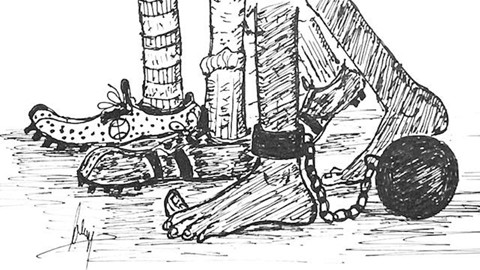
“Government cannot make us equal; it can only recognize, respect, and protect us as equal before the law.” Associate Supreme Court Justice Clarence Thomas, June 12, 1995
While this writer was a part of the teaching profession he supported his students in their various extra-curricular activities. He once attended a high school soccer game which saw his students lose through outrageously unfair refereeing. There was no question in anybody’s mind with respect to the abilities of the players on both teams, as the game could have gone either way. But what the referee did that afternoon was glaring and unconscionable. He also witnessed similar biased adjudication in the final of a competition that was academically based. Again, the abilities of team members were not at issue, but the condition of “the playing field” was, so to speak. Those were microcosms of real life, but also, unfortunately, very hard lessons for ones so young to learn in the manner that they did. Equal ability does not always ensure equal outcomes.
The picture painted by Justice Clarence Thomas, by the first phrases in the sentence of the above quotation with respect to affirmative action, is of a government which appears to be a powerless, a detached or an aloof entity, one which only has the authority to identify, to define and then to declare something, but one that is not able to do anything concrete about it. If this writer understood the judge correctly, he was speaking of people’s innate abilities and of the government’s involvement by intervening in and by administering the affairs of men with respect to such abilities through affirmative action.
If a man, for example, is deemed through testing, to be an “A-student” and another, through testing, is determined to be a “B-student” then the government is incapable of making them equal. In such a case, Justice Thomas’ argument would have merit. But, was his approach to affirmative action, from an opinion he wrote in opposition to it, too narrow? Was affirmative action trying to give one possessing lower ability an advantage over one possessing higher ability? Or, was affirmative action seeking, perfectly or imperfectly, to address any handicaps built into the field of play itself due to white racism against Afro-Americans?
If affirmative action was designed to rectify the disadvantage of a Black “‘B’-student”, brought on in whole or in part by factors beyond the control of that “‘B’-student”, which caused him to end up, positionally, behind a white “‘A’-student” should such factors never be addressed because the latter would, presumably, have surpassed the former anyway in order to qualify for college matriculation? And what of the white “‘C’- student” who got accepted over the Black “‘B’-student” for similar reasons? Would that be justice? Should no attempt be made to rectify the situation? Admittedly, that is a difficult situation with no easy solutions. Such is the stain left by white racism. But, should government not attempt to do anything about it? Should a sharp, jagged rock be casually discarded in the absence of a finely crafted scalpel which has been forged from high tempered steel?
Government action might never be able to make any man equal in respect to his intrinsic, God given dignity and ability, possessed from birth, and considered as his inalienable right, in comparison to his peers. But, as history has shown us, government, through force of laws, is more than able to shroud the dignity of a man and to stymie his ability, thus not allowing him to thrive through the force of its discriminatory laws. By so doing it has given an unfair advantage to others, whether they be individuals possessing inferior, equal or superior ability to the one so denied, positionally, on the field of play. Government, can, in such an instance, make a man unequal to his peers. If it can do so, it can, by the same token, seek reasonable remedies towards rectifying the situation.
Government, through its system of jurisprudence, through its rulings in the areas of laws of tort, laws of contract, and through criminal law daily seeks to rebalance the scales of inequity or of loss brought about by the trespasses, the breaches of promise, and by criminal acts committed by parties against other parties on a regular basis. By such restorative acts government is not attempting to re-write the genotype of people, but seeking to give back to them what is their due. In international law, in the aftermath of war, government has sought and has secured reparations for one party, without seeking to complicate the process with questions of whether those who were deprived or dispossessed were intrinsically equal in dignity and ability to the offender or not. Associate Justice Clarence Thomas knows this better than most, or he ought to.
To say that government cannot make us equal, as Associate Justice Clarence Thomas asserts, is either an exhibition of a woeful ignorance of history or of arrogant intellectual dishonesty where white racism against Afro-Americans is concerned. By decree, the government freed the slaves, by decree it repealed laws which recognized the rights of citizenship as belonging only to whites, and by decree it forced society to accept the votes of those who were at one time regarded as slaves. All these it did with the threat of penalties for noncompliance. Penalties are assessed against a team in a football game when it has committed an infraction against another. The ruling of the referee seeks to bring about parity in a specific instance, on the field of play, without limiting the natural level of skills possessed by either team. Is there a case to be made, therefore, for the Afro-American experience from U.S. history?
Associate Justice Clarence Thomas then stated that though government cannot make men equal, with respect to their innate abilities, that it, can, nonetheless, protect those so adversely affected from discrimination. But, how does the government do that? By what legal instrument or through what action did he see the government accomplishing this task? Then again, he might not have seen his role as a judge as giving a prescription for extinguishing a raging fire, but, merely, as one that is limited in scope to only describing and then to defining a tragic act of arson that is in progress.
In the National Football League (NFL), if two teams begin a game with one team being completely without protective helmets, without shoulder pads and without cleats, with the other fully protected, and with the former beginning without ball in hand at their very own goal line — what would be the likely outcome to that game? What would Justice Thomas think ought to be done in such as scenario? How would he define “protection”, especially if the shirtless and barefooted team were those of his own race? Perhaps his hands would be tied as that of the government he perceived in his legal opinion in respect to any remedies needed to address the malignancies of white racism and bigotry.
Justice Thomas would do well to seriously ponder the following words of Dr. Martin Luther King, Jr., while considering future cases having to do with Afro-Americans or other minorities who have been placed by man, and not by God, at a distinct disadvantageous position in society:
“It’s all right to tell a man to lift himself by his own bootstraps, but it is cruel jest to say to a bootless man that he ought to lift himself by his own bootstraps.”



